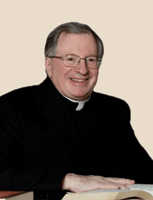It is hard to believe that the day has come. We have been looking forward to America’s 100th anniversary for several years and planning for the event for three years. During the past year, we have been re-publishing a sampler of contributions from some of our more famous authors and a series of historical pieces about some of our more colorful predecessors to share with you.
In this issue we bring that historical retrospective to its conclusion. The historian Charles Morris, author of American Catholic, reviews the changing currents of editorial opinion through the decades of America’s publication. James T. Keane, S.J., and Jim McDermott, S.J., who have been responsible for much archival work over the last couple of years, each adds a final note. With an ironic eye, Mr. Keane exposes to view some of our “hits and misses.”
Conscious of the lacunae in our archives, Father McDermott has assembled a selection of reminiscences by former editors. Years from now historians will be praising his name for filling in gaps in our records. (You can hear current editors share their stories with Tim Reidy on our weekly podcast at www.americamagazine.org/podcast.)
In his essay on the shape of the church to come,Timothy Radcliffe, O.P., asks, “What sort of dynamic interaction with the world would let the church flourish?” “Like a tree confined in the angle of a rock,” he writes, the church has found itself “cramped” into ideological positions that have prevented it from flourishing. Ironically, much of the cramping in the church comes from an unexamined Enlightenment mentality. The Enlightenment set teachers over the unenlightened. In the 21st century, Father Radcliffe points out, learning is dialogical, so preaching and teaching will be conversational.
In surveying the last 50 years of ecumenical encounters, the Rev. Martin E. Marty sees conversation among different denominations of Christians to be privileged moments where we have learned to take responsibility for one another. In the 21st century, he argues, Christians must be prepared to see the face of the other in the Muslim and the secularist as well. Catholics and Protestants must also come face to face with spiritual seekers. They have to reckon too how they can overcome the fact that they still remain “as distant as ever from each other in separate gatherings at the Lord’s Table, the Eucharist.”
One of the fields in which Protestants and Catholics, Jews and Muslims, often come together with spiritual seekers is care for the Earth. In her essay on Christology, Elizabeth Johnson, C.S.J., argues that our heightened awareness of the natural world allows theology “to play melodies about the cosmos that have not been heard for centuries.” She points out how “earthy” Jesus’ ministry was and how his death released “an earthy hope” because the resurrection embraces all creation.
Helen Prejean, C.S.J., reflects on how her own personal vocation as an activist against the death penalty and for reconciliation of victims and offenders has expanded in the current of the Sisters of Saint Joseph, which joins the stream of all Christians who follow, imitate and embody Christ. She invites us all to take the ride when we hear “the cry of Christ” calling us on. “If it is not scary and surprising and an adventure all at the same time,” she writes, “it is not the call of the Gospel of Jesus.”
This small anthology is our thanks to you our readers, authors and benefactors. We hope that like the blossoms of spring, it offers you an anticipation of the rich offerings to come in America’s second century.








